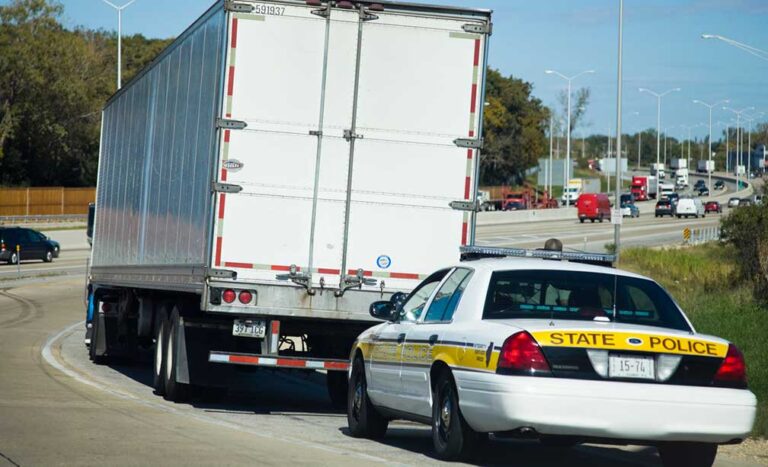What is CSA? Let’s start with the basics
The Compliance, Safety, Accountability (CSA) program is how the Federal Motor Carrier Safety Administration (FMCSA) monitors safety performance for drivers and carriers. It’s broken down into “BASICs” — Behavior Analysis and Safety Improvement Categories — such as unsafe driving, hours-of-service compliance, vehicle maintenance and controlled substances.
Each roadside violation you rack up during an inspection adds points to these categories. And here’s the kicker: These aren’t just “naughty marks” on a report card.
- They affect your PSP (Pre-Employment Screening Program), which potential employers can see.
- They affect your carrier’s safety score, which can lead to more inspections and fewer contracts.
- And they can even raise your insurance rates or lead to DOT audits.
So, no — a CSA violation is not “just a logbook violation.” It’s a 21-point torpedo that could sink your hiring chances for the next three years.
The CSA math: It’s different for carriers and drivers
Violations are assigned a severity weight from 1 to 10, depending on how dangerous the offense is considered. For example:
- Logbook error? 5 points.
- Speeding 15+ over? 10 points.
- Driving after being declared out of service? 10 points and a migraine.
Then comes the time-weight multiplier — designed to give more “impact” to recent violations:
- 0–6 months ago: x3
- 6–12 months ago: x2
- 12–24 months ago: x1
- Over 24 months ago: Dropped from CSA scoring
These weights apply to your carrier’s safety profile, and they determine how likely your company is to face scrutiny by the U.S. Department of Transportation.
On the driver side, the violation can still show up on your PSP report for 3 years — but there’s no scoring or weighting system there. It’s just raw data that employers get to interpret however they like.
How to fight back: DataQ Is your best friend (when it works)
Let’s say you were cited for a lane change violation. You go to court, plead it down to a non-moving violation — or it’s dismissed altogether. You win, right?
WRONG. That violation will still appear on your PSP and FMCSA record unless you file a DataQ challenge.
DataQ is the FMCSA’s system for disputing errors in your safety record. It’s like a complaint box… if the complaint box were handled by the same agency that gave you the violation in the first place.
What you need to file a DataQ challenge:
- Court documentation (dismissal, amendment, not guilty verdict).
- Citation number and inspection report.
- Any supporting evidence (photos, logs, witness statements).
Pro tip: File your challenge as soon as the court decision is final. Delays reduce your chances of success — and it’s much harder to dig up paperwork a year later when your next job is on the line.
Not all states respond the same way
Here’s the part that may surprise you: Even if the court tosses your ticket, not every state honors that decision through FMCSA channels.
As of 2025, some states, such as Texas and Georgia, do not update your inspection report based on court outcomes, claiming the officer’s original observation during the inspection is what counts — not the legal resolution.
If that sounds unfair to you, you’re not alone in feeling that way. However, the last thing you want to do is throw a tantrum with the authorities. Instead, I tell drivers to:
- Keep copies of all court outcomes.
- Ask for “amended to non-moving” language in writing.
- Include a statement with your DataQ challenge if the violation doesn’t reflect what actually happened.
Don’t let bad data haunt you
You might think, “It’s one ticket. One inspection. What’s the big deal?”
Unfortunately, that one bad mark can:
- Disqualify you from a new driving job.
- Raise your insurance premiums.
- Lead to more inspections at weigh stations.
- Keep you from hauling high-paying freight under certain contracts.
And here’s the worst part: if you don’t fight it, nobody else will. Not your carrier. Not your dispatcher. Not the court. You have to be your own advocate.
Final mile advice
Here’s how to stay ahead of the CSA curve in 2025:
- Request your PSP report at least twice a year (it’s free once a year).
- Keep digital copies of tickets, court outcomes, and inspection reports.
- Challenge every inaccurate violation — don’t let it sit.
- Work with a law firm if you want support from a professional who works with court systems as their career so you can stay focused on your professional driving career.
- And most importantly, don’t assume the system is automatically fair.
While the road may be long, the memory of a CSA violation is even longer.
Brad Klepper is a regular contributor to The Trucker, providing valuable insights for drivers and motor carriers. He serves as president of Drivers Legal Plan, a national law firm offering discounted CDL ticket defense to members, and Interstate Trucker, a law firm providing CDL defense with no monthly fees.









interesting.
Fascinating that any code would allow an officer to be the final authority. It does not seem the so called checks and balances matter. It is actually to the point of totalitarianism. Not all law enforcement folks are “bad cops” however there are many instances where a fine, violation or crime needs a court of law. A new driver or an old salty one could easily be unjustly taken off the csa. Surprising that organizations that are meant to help drivers/carriers have not gone full throttle on this unjust ruling.
Yes…your country is nothing but a NORTH KOREA..it is in all his ways nothing but a FAILURE …where the government should stay out ..she isn’t and Viva versa ..